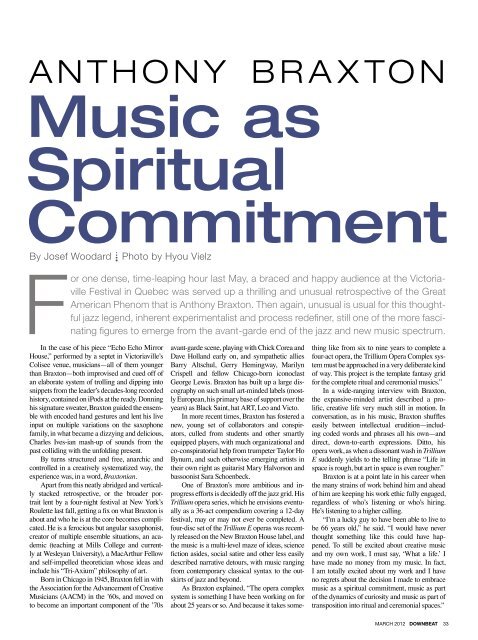Create successful ePaper yourself
Turn your PDF publications into a flip-book with our unique Google optimized e-Paper software.
Anthony Braxton<br />
Music as<br />
Spiritual<br />
Commitment<br />
By Josef Woodard " Photo by Hyou Vielz<br />
For one dense, time-leaping hour last May, a braced and happy audience at the Victoriaville<br />
Festival in Quebec was served up a thrilling and unusual retrospective of the Great<br />
American Phenom that is Anthony Braxton. Then again, unusual is usual for this thoughtful<br />
jazz legend, inherent experimentalist and process redefiner, still one of the more fascinating<br />
figures to emerge from the avant-garde end of the jazz and new music spectrum.<br />
In the case of his piece “Echo Echo Mirror<br />
House,” performed by a septet in Victoriaville’s<br />
Colisee venue, musicians—all of them younger<br />
than Braxton—both improvised and cued off of<br />
an elaborate system of trolling and dipping into<br />
snippets from the leader’s decades-long recorded<br />
history, contained on iPods at the ready. Donning<br />
his signature sweater, Braxton guided the ensemble<br />
with encoded hand gestures and lent his live<br />
input on multiple variations on the saxophone<br />
family, in what became a dizzying and delicious,<br />
Charles Ives-ian mash-up of sounds from the<br />
past colliding with the unfolding present.<br />
By turns structured and free, anarchic and<br />
controlled in a creatively systematized way, the<br />
experience was, in a word, Braxtonian.<br />
Apart from this neatly abridged and vertically<br />
stacked retrospective, or the broader portrait<br />
lent by a four-night festival at New York’s<br />
Roulette last fall, getting a fix on what Braxton is<br />
about and who he is at the core becomes complicated.<br />
He is a ferocious but angular saxophonist,<br />
creator of multiple ensemble situations, an academic<br />
(teaching at Mills College and currently<br />
at Wesleyan University), a MacArthur Fellow<br />
and self-impelled theoretician whose ideas and<br />
include his “Tri-Axium” philosophy of art.<br />
Born in Chicago in 1945, Braxton fell in with<br />
the Association for the Advancement of Creative<br />
Musicians (AACM) in the ’60s, and moved on<br />
to become an important component of the ’70s<br />
avant-garde scene, playing with Chick Corea and<br />
Dave Holland early on, and sympathetic allies<br />
Barry Altschul, Gerry Hemingway, Marilyn<br />
Crispell and fellow Chicago-born iconoclast<br />
George Lewis. Braxton has built up a large discography<br />
on such small art-minded labels (mostly<br />
European, his primary base of support over the<br />
years) as Black Saint, hat ART, Leo and Victo.<br />
In more recent times, Braxton has fostered a<br />
new, young set of collaborators and conspirators,<br />
culled from students and other smartly<br />
equipped players, with much organizational and<br />
co-conspiratorial help from trumpeter Taylor Ho<br />
Bynum, and such otherwise emerging artists in<br />
their own right as guitarist Mary Halvorson and<br />
bassoonist Sara Schoenbeck.<br />
One of Braxton’s more ambitious and inprogress<br />
efforts is decidedly off the jazz grid. His<br />
Trillium opera series, which he envisions eventually<br />
as a 36-act compendium covering a 12-day<br />
festival, may or may not ever be completed. A<br />
four-disc set of the Trillium E operas was recently<br />
released on the New Braxton House label, and<br />
the music is a multi-level maze of ideas, science<br />
fiction asides, social satire and other less easily<br />
described narrative detours, with music ranging<br />
from contemporary classical syntax to the outskirts<br />
of jazz and beyond.<br />
As Braxton explained, “The opera complex<br />
system is something I have been working on for<br />
about 25 years or so. And because it takes something<br />
like from six to nine years to complete a<br />
four-act opera, the Trillium Opera Complex system<br />
must be approached in a very deliberate kind<br />
of way. This project is the template fantasy grid<br />
for the complete ritual and ceremonial musics.”<br />
In a wide-ranging interview with Braxton,<br />
the expansive-minded artist described a prolific,<br />
creative life very much still in motion. In<br />
conversation, as in his music, Braxton shuffles<br />
easily between intellectual erudition—including<br />
coded words and phrases all his own—and<br />
direct, down-to-earth expressions. Ditto, his<br />
opera work, as when a dissonant wash in Trillium<br />
E suddenly yields to the telling phrase “Life in<br />
space is rough, but art in space is even rougher.”<br />
Braxton is at a point late in his career when<br />
the many strains of work behind him and ahead<br />
of him are keeping his work ethic fully engaged,<br />
regardless of who’s listening or who’s hiring.<br />
He’s listening to a higher calling.<br />
“I’m a lucky guy to have been able to live to<br />
be 66 years old,” he said. “I would have never<br />
thought something like this could have happened.<br />
To still be excited about creative music<br />
and my own work, I must say, ‘What a life.’ I<br />
have made no money from my music. In fact,<br />
I am totally excited about my work and I have<br />
no regrets about the decision I made to embrace<br />
music as a spiritual commitment, music as part<br />
of the dynamics of curiosity and music as part of<br />
transposition into ritual and ceremonial spaces.”<br />
MARCH 2012 DOWNBEAT 33

















